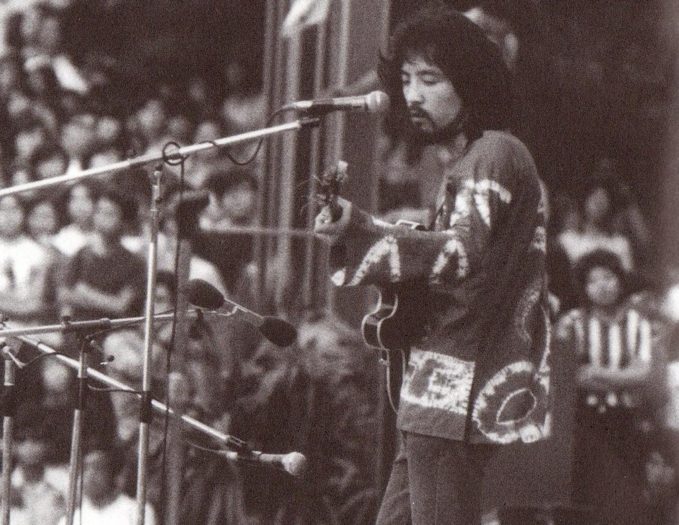Brain Police (“Zuno Keisatsu”) were one of the most incendiary bands to emerge in the cultural and political turmoil of late 1960s Japan. They took their name from an obscure Frank Zappa song and their bongo-and-guitar driven sound from Marc Bolan.
Their politics came courtesy of Japan’s Red Army Faction, a far left grouping that advocated violent revolution and gave birth to even more extreme grouplets, such as the United Red Army, which killed 12 of its own members in the Asama Lodge incident of 1971.
Lyrics by Shuji Terayama; music by Panta; recorded by Brain Police in 2013. The song is actually a collage of Terayama’s words taken from different sources and put together by long-term Terayama acolyte, playwright Ei Takatori.
The lyrics in English are as follows –
A NEW ERA RIDES IN ON A CIRCUS ELEPHANT
You can start all over again from any place
You’re the hero of a fragment of a story
That you created yourself
But at least let’s hear it
Not a nightmare, but the echo of a circus waltz
A new era is slowly coming closer
Astride a cowardly elephant
Let’s at least teach this elephant
Some circus tricks
You’re living here
Between war and war
That’s something you can’t forget
But at least let’s hear it
Not a nightmare, but the echo of a circus waltz
A new era is slowly coming closer
Astride a cowardly elephant
Let’s at least teach this elephant
Some circus tricks
No major recording company would handle Brain Police’s first album, which included ditties such as Declaration of Global Revolutionary War and Grab a Gun Parts 1 and 2. Instead the band released it on their own label in 1970. Their anti-establishment street cred was cemented by the album cover which featured the identikit photo of the criminal genius behind Japan’s equivalent of the Great Train Robbery.

Here’s what happened. On December 10th 1968 a security van was en route to the offices of Toshiba to deliver cash for distribution as employee bonuses. On a quiet backstreet a police motorbike pulled alongside the van and flagged it down. The helmeted cop explained to the security men that police HQ had information about a bomb threat and ordered them out while he examined the underside of the vehicle.
During the “search”, the man in the police uniform planted a small explosive, which went off soon afterwards, then informed the petrified security guys that he would drive the van to an open space and make it safe. They stood there in the street marveling at the man’s bravery as he disappeared into the distance.
The bogus cop was never seen again. Despite a 7 year investigation involving 170,000 police and a list of 110,000 suspects, the crime remains unsolved to this day.
No violence, no accomplices. Just a few props and extraordinary acting ability. The haul – the yen equivalent of $10 million in today’s money.
This world is overflowing with so much mystery –why do detective story writers feel it necessary to create new ones? Shuji Terayama, from Dracula Pencil
Brain Police formed around the two core members of “Panta” Nakamura and Toshi Ishizuka in 1969, the year that Shuji Terayama started Tenjo Sajiki, his avant garde theatre troupe. According to Panta, the only time they met was when Terayama mistakenly stuck his head into a studio where Brain Police were recording.
Several songs from BP’s first two albums were banned from the airwaves, but subsequently they moved away from radical politics and emphasized more sophisticated and reflective material, featuring, for example, lyrics based on the poetry of Herman Hesse.
After various hiatuses and alternative formations, Panta and Toshi came together again in 2001 and in 2013 they released Dark Turn, a Terayama-themed CD to mark the 30th anniversary of his death.
Capitalist society is, you might say, one gigantic circus. Shuji Terayama, from How Many Miles to the Graveyard?
